Essay on Deming's Observations and Performance Management
VerifiedAdded on 2020/04/01
|9
|2867
|404
Essay
AI Summary
This essay delves into the realm of performance management, beginning with a traditional overview of performance review systems and their alignment with organizational objectives. It introduces Deming's critical observations on performance management, highlighting its potential pitfalls such as fostering short-term focus, undermining teamwork, and cultivating fear within organizations. The essay then transitions to a detailed analysis of how contemporary organizations are addressing these adverse outcomes, examining strategies like implementing ethical codes, fostering teamwork, promoting employee empowerment, and setting appropriate goals. The essay concludes by emphasizing the continued relevance of Deming's approach, advocating for changes in organizational philosophy, leadership styles, and methods of measuring success to create a more effective and employee-centric performance management system.

NAME:
DATE:
UNIT:
DATE:
UNIT:
Paraphrase This Document
Need a fresh take? Get an instant paraphrase of this document with our AI Paraphraser
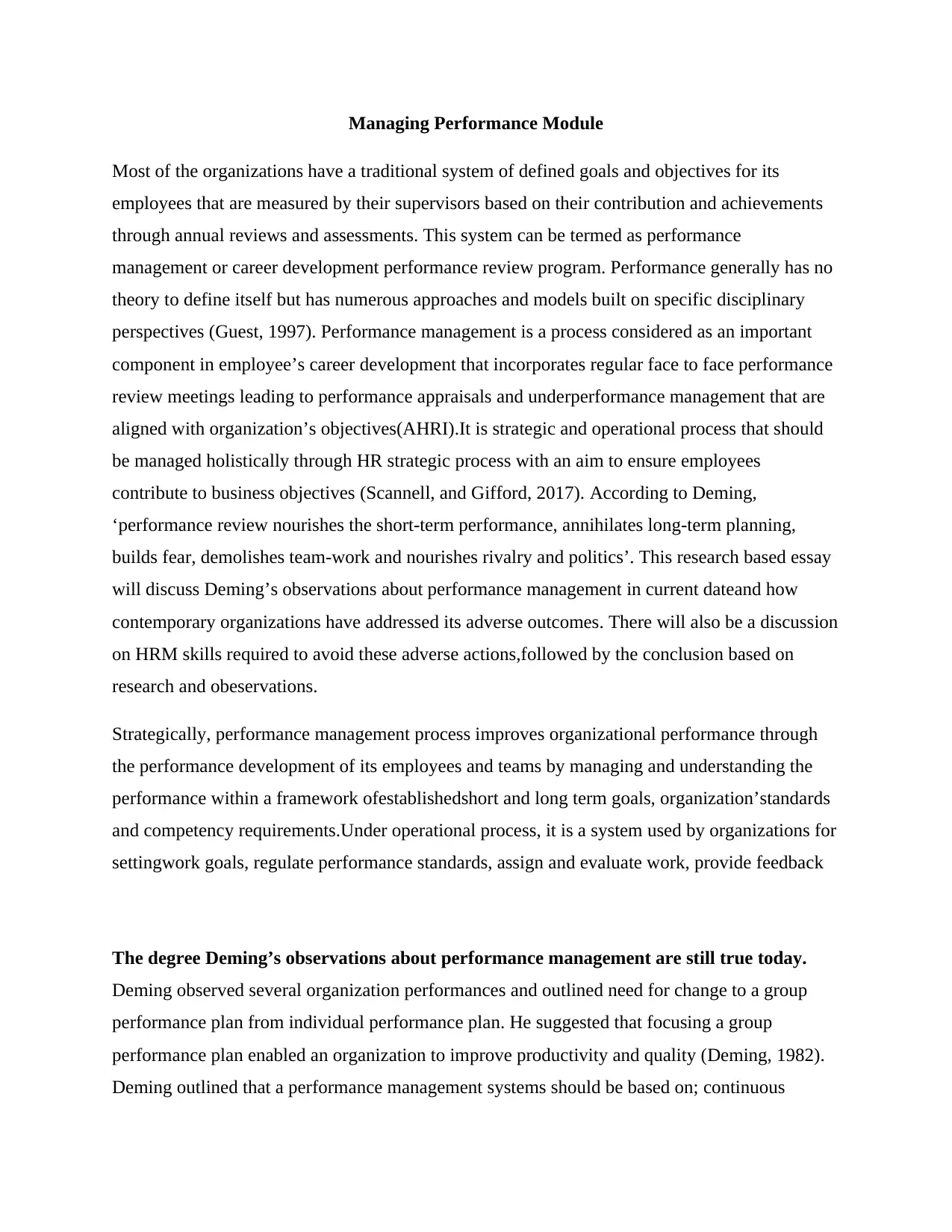
Managing Performance Module
Most of the organizations have a traditional system of defined goals and objectives for its
employees that are measured by their supervisors based on their contribution and achievements
through annual reviews and assessments. This system can be termed as performance
management or career development performance review program. Performance generally has no
theory to define itself but has numerous approaches and models built on specific disciplinary
perspectives (Guest, 1997). Performance management is a process considered as an important
component in employee’s career development that incorporates regular face to face performance
review meetings leading to performance appraisals and underperformance management that are
aligned with organization’s objectives(AHRI).It is strategic and operational process that should
be managed holistically through HR strategic process with an aim to ensure employees
contribute to business objectives (Scannell, and Gifford, 2017). According to Deming,
‘performance review nourishes the short-term performance, annihilates long-term planning,
builds fear, demolishes team-work and nourishes rivalry and politics’. This research based essay
will discuss Deming’s observations about performance management in current dateand how
contemporary organizations have addressed its adverse outcomes. There will also be a discussion
on HRM skills required to avoid these adverse actions,followed by the conclusion based on
research and obeservations.
Strategically, performance management process improves organizational performance through
the performance development of its employees and teams by managing and understanding the
performance within a framework ofestablishedshort and long term goals, organization’standards
and competency requirements.Under operational process, it is a system used by organizations for
settingwork goals, regulate performance standards, assign and evaluate work, provide feedback
The degree Deming’s observations about performance management are still true today.
Deming observed several organization performances and outlined need for change to a group
performance plan from individual performance plan. He suggested that focusing a group
performance plan enabled an organization to improve productivity and quality (Deming, 1982).
Deming outlined that a performance management systems should be based on; continuous
Most of the organizations have a traditional system of defined goals and objectives for its
employees that are measured by their supervisors based on their contribution and achievements
through annual reviews and assessments. This system can be termed as performance
management or career development performance review program. Performance generally has no
theory to define itself but has numerous approaches and models built on specific disciplinary
perspectives (Guest, 1997). Performance management is a process considered as an important
component in employee’s career development that incorporates regular face to face performance
review meetings leading to performance appraisals and underperformance management that are
aligned with organization’s objectives(AHRI).It is strategic and operational process that should
be managed holistically through HR strategic process with an aim to ensure employees
contribute to business objectives (Scannell, and Gifford, 2017). According to Deming,
‘performance review nourishes the short-term performance, annihilates long-term planning,
builds fear, demolishes team-work and nourishes rivalry and politics’. This research based essay
will discuss Deming’s observations about performance management in current dateand how
contemporary organizations have addressed its adverse outcomes. There will also be a discussion
on HRM skills required to avoid these adverse actions,followed by the conclusion based on
research and obeservations.
Strategically, performance management process improves organizational performance through
the performance development of its employees and teams by managing and understanding the
performance within a framework ofestablishedshort and long term goals, organization’standards
and competency requirements.Under operational process, it is a system used by organizations for
settingwork goals, regulate performance standards, assign and evaluate work, provide feedback
The degree Deming’s observations about performance management are still true today.
Deming observed several organization performances and outlined need for change to a group
performance plan from individual performance plan. He suggested that focusing a group
performance plan enabled an organization to improve productivity and quality (Deming, 1982).
Deming outlined that a performance management systems should be based on; continuous
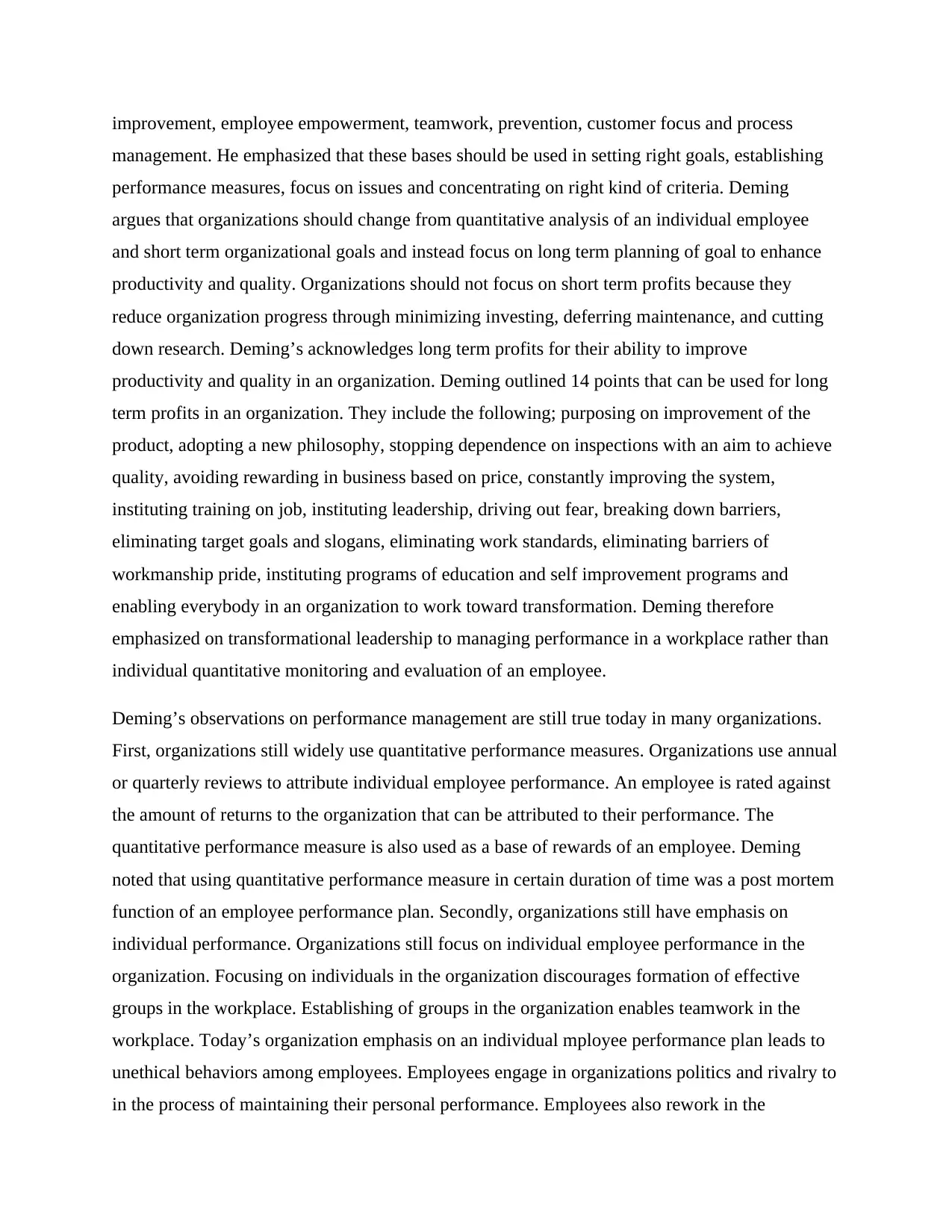
improvement, employee empowerment, teamwork, prevention, customer focus and process
management. He emphasized that these bases should be used in setting right goals, establishing
performance measures, focus on issues and concentrating on right kind of criteria. Deming
argues that organizations should change from quantitative analysis of an individual employee
and short term organizational goals and instead focus on long term planning of goal to enhance
productivity and quality. Organizations should not focus on short term profits because they
reduce organization progress through minimizing investing, deferring maintenance, and cutting
down research. Deming’s acknowledges long term profits for their ability to improve
productivity and quality in an organization. Deming outlined 14 points that can be used for long
term profits in an organization. They include the following; purposing on improvement of the
product, adopting a new philosophy, stopping dependence on inspections with an aim to achieve
quality, avoiding rewarding in business based on price, constantly improving the system,
instituting training on job, instituting leadership, driving out fear, breaking down barriers,
eliminating target goals and slogans, eliminating work standards, eliminating barriers of
workmanship pride, instituting programs of education and self improvement programs and
enabling everybody in an organization to work toward transformation. Deming therefore
emphasized on transformational leadership to managing performance in a workplace rather than
individual quantitative monitoring and evaluation of an employee.
Deming’s observations on performance management are still true today in many organizations.
First, organizations still widely use quantitative performance measures. Organizations use annual
or quarterly reviews to attribute individual employee performance. An employee is rated against
the amount of returns to the organization that can be attributed to their performance. The
quantitative performance measure is also used as a base of rewards of an employee. Deming
noted that using quantitative performance measure in certain duration of time was a post mortem
function of an employee performance plan. Secondly, organizations still have emphasis on
individual performance. Organizations still focus on individual employee performance in the
organization. Focusing on individuals in the organization discourages formation of effective
groups in the workplace. Establishing of groups in the organization enables teamwork in the
workplace. Today’s organization emphasis on an individual mployee performance plan leads to
unethical behaviors among employees. Employees engage in organizations politics and rivalry to
in the process of maintaining their personal performance. Employees also rework in the
management. He emphasized that these bases should be used in setting right goals, establishing
performance measures, focus on issues and concentrating on right kind of criteria. Deming
argues that organizations should change from quantitative analysis of an individual employee
and short term organizational goals and instead focus on long term planning of goal to enhance
productivity and quality. Organizations should not focus on short term profits because they
reduce organization progress through minimizing investing, deferring maintenance, and cutting
down research. Deming’s acknowledges long term profits for their ability to improve
productivity and quality in an organization. Deming outlined 14 points that can be used for long
term profits in an organization. They include the following; purposing on improvement of the
product, adopting a new philosophy, stopping dependence on inspections with an aim to achieve
quality, avoiding rewarding in business based on price, constantly improving the system,
instituting training on job, instituting leadership, driving out fear, breaking down barriers,
eliminating target goals and slogans, eliminating work standards, eliminating barriers of
workmanship pride, instituting programs of education and self improvement programs and
enabling everybody in an organization to work toward transformation. Deming therefore
emphasized on transformational leadership to managing performance in a workplace rather than
individual quantitative monitoring and evaluation of an employee.
Deming’s observations on performance management are still true today in many organizations.
First, organizations still widely use quantitative performance measures. Organizations use annual
or quarterly reviews to attribute individual employee performance. An employee is rated against
the amount of returns to the organization that can be attributed to their performance. The
quantitative performance measure is also used as a base of rewards of an employee. Deming
noted that using quantitative performance measure in certain duration of time was a post mortem
function of an employee performance plan. Secondly, organizations still have emphasis on
individual performance. Organizations still focus on individual employee performance in the
organization. Focusing on individuals in the organization discourages formation of effective
groups in the workplace. Establishing of groups in the organization enables teamwork in the
workplace. Today’s organization emphasis on an individual mployee performance plan leads to
unethical behaviors among employees. Employees engage in organizations politics and rivalry to
in the process of maintaining their personal performance. Employees also rework in the
⊘ This is a preview!⊘
Do you want full access?
Subscribe today to unlock all pages.

Trusted by 1+ million students worldwide
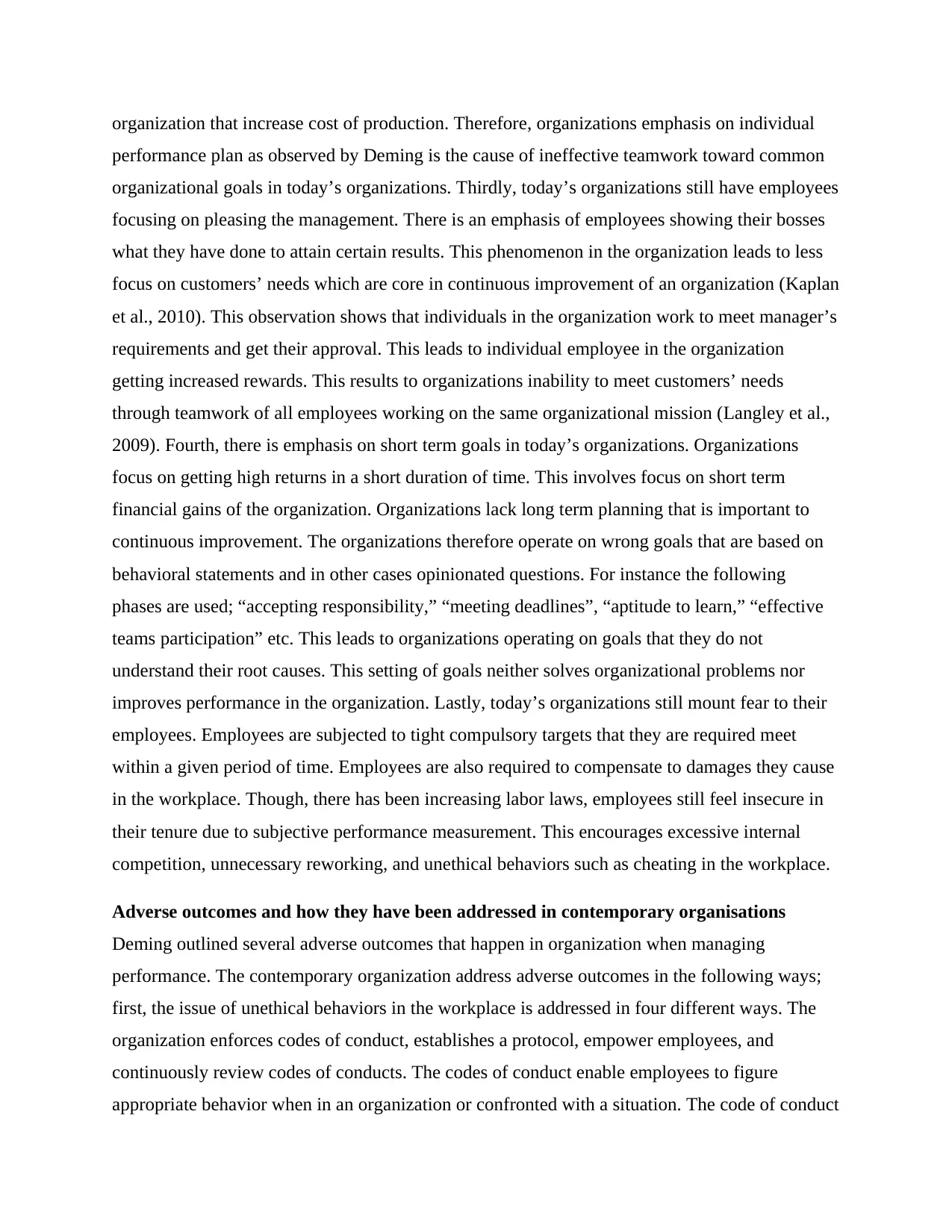
organization that increase cost of production. Therefore, organizations emphasis on individual
performance plan as observed by Deming is the cause of ineffective teamwork toward common
organizational goals in today’s organizations. Thirdly, today’s organizations still have employees
focusing on pleasing the management. There is an emphasis of employees showing their bosses
what they have done to attain certain results. This phenomenon in the organization leads to less
focus on customers’ needs which are core in continuous improvement of an organization (Kaplan
et al., 2010). This observation shows that individuals in the organization work to meet manager’s
requirements and get their approval. This leads to individual employee in the organization
getting increased rewards. This results to organizations inability to meet customers’ needs
through teamwork of all employees working on the same organizational mission (Langley et al.,
2009). Fourth, there is emphasis on short term goals in today’s organizations. Organizations
focus on getting high returns in a short duration of time. This involves focus on short term
financial gains of the organization. Organizations lack long term planning that is important to
continuous improvement. The organizations therefore operate on wrong goals that are based on
behavioral statements and in other cases opinionated questions. For instance the following
phases are used; “accepting responsibility,” “meeting deadlines”, “aptitude to learn,” “effective
teams participation” etc. This leads to organizations operating on goals that they do not
understand their root causes. This setting of goals neither solves organizational problems nor
improves performance in the organization. Lastly, today’s organizations still mount fear to their
employees. Employees are subjected to tight compulsory targets that they are required meet
within a given period of time. Employees are also required to compensate to damages they cause
in the workplace. Though, there has been increasing labor laws, employees still feel insecure in
their tenure due to subjective performance measurement. This encourages excessive internal
competition, unnecessary reworking, and unethical behaviors such as cheating in the workplace.
Adverse outcomes and how they have been addressed in contemporary organisations
Deming outlined several adverse outcomes that happen in organization when managing
performance. The contemporary organization address adverse outcomes in the following ways;
first, the issue of unethical behaviors in the workplace is addressed in four different ways. The
organization enforces codes of conduct, establishes a protocol, empower employees, and
continuously review codes of conducts. The codes of conduct enable employees to figure
appropriate behavior when in an organization or confronted with a situation. The code of conduct
performance plan as observed by Deming is the cause of ineffective teamwork toward common
organizational goals in today’s organizations. Thirdly, today’s organizations still have employees
focusing on pleasing the management. There is an emphasis of employees showing their bosses
what they have done to attain certain results. This phenomenon in the organization leads to less
focus on customers’ needs which are core in continuous improvement of an organization (Kaplan
et al., 2010). This observation shows that individuals in the organization work to meet manager’s
requirements and get their approval. This leads to individual employee in the organization
getting increased rewards. This results to organizations inability to meet customers’ needs
through teamwork of all employees working on the same organizational mission (Langley et al.,
2009). Fourth, there is emphasis on short term goals in today’s organizations. Organizations
focus on getting high returns in a short duration of time. This involves focus on short term
financial gains of the organization. Organizations lack long term planning that is important to
continuous improvement. The organizations therefore operate on wrong goals that are based on
behavioral statements and in other cases opinionated questions. For instance the following
phases are used; “accepting responsibility,” “meeting deadlines”, “aptitude to learn,” “effective
teams participation” etc. This leads to organizations operating on goals that they do not
understand their root causes. This setting of goals neither solves organizational problems nor
improves performance in the organization. Lastly, today’s organizations still mount fear to their
employees. Employees are subjected to tight compulsory targets that they are required meet
within a given period of time. Employees are also required to compensate to damages they cause
in the workplace. Though, there has been increasing labor laws, employees still feel insecure in
their tenure due to subjective performance measurement. This encourages excessive internal
competition, unnecessary reworking, and unethical behaviors such as cheating in the workplace.
Adverse outcomes and how they have been addressed in contemporary organisations
Deming outlined several adverse outcomes that happen in organization when managing
performance. The contemporary organization address adverse outcomes in the following ways;
first, the issue of unethical behaviors in the workplace is addressed in four different ways. The
organization enforces codes of conduct, establishes a protocol, empower employees, and
continuously review codes of conducts. The codes of conduct enable employees to figure
appropriate behavior when in an organization or confronted with a situation. The code of conduct
Paraphrase This Document
Need a fresh take? Get an instant paraphrase of this document with our AI Paraphraser
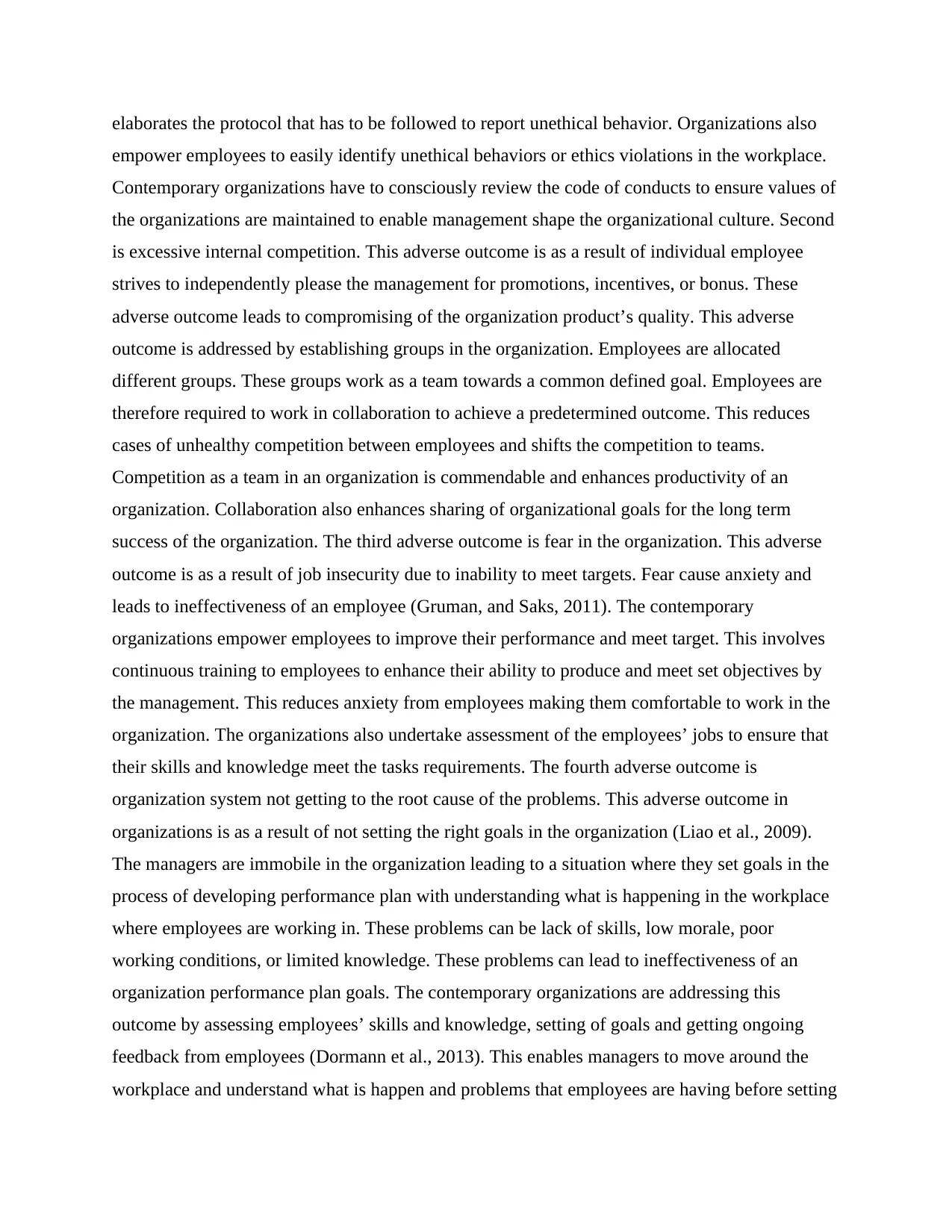
elaborates the protocol that has to be followed to report unethical behavior. Organizations also
empower employees to easily identify unethical behaviors or ethics violations in the workplace.
Contemporary organizations have to consciously review the code of conducts to ensure values of
the organizations are maintained to enable management shape the organizational culture. Second
is excessive internal competition. This adverse outcome is as a result of individual employee
strives to independently please the management for promotions, incentives, or bonus. These
adverse outcome leads to compromising of the organization product’s quality. This adverse
outcome is addressed by establishing groups in the organization. Employees are allocated
different groups. These groups work as a team towards a common defined goal. Employees are
therefore required to work in collaboration to achieve a predetermined outcome. This reduces
cases of unhealthy competition between employees and shifts the competition to teams.
Competition as a team in an organization is commendable and enhances productivity of an
organization. Collaboration also enhances sharing of organizational goals for the long term
success of the organization. The third adverse outcome is fear in the organization. This adverse
outcome is as a result of job insecurity due to inability to meet targets. Fear cause anxiety and
leads to ineffectiveness of an employee (Gruman, and Saks, 2011). The contemporary
organizations empower employees to improve their performance and meet target. This involves
continuous training to employees to enhance their ability to produce and meet set objectives by
the management. This reduces anxiety from employees making them comfortable to work in the
organization. The organizations also undertake assessment of the employees’ jobs to ensure that
their skills and knowledge meet the tasks requirements. The fourth adverse outcome is
organization system not getting to the root cause of the problems. This adverse outcome in
organizations is as a result of not setting the right goals in the organization (Liao et al., 2009).
The managers are immobile in the organization leading to a situation where they set goals in the
process of developing performance plan with understanding what is happening in the workplace
where employees are working in. These problems can be lack of skills, low morale, poor
working conditions, or limited knowledge. These problems can lead to ineffectiveness of an
organization performance plan goals. The contemporary organizations are addressing this
outcome by assessing employees’ skills and knowledge, setting of goals and getting ongoing
feedback from employees (Dormann et al., 2013). This enables managers to move around the
workplace and understand what is happen and problems that employees are having before setting
empower employees to easily identify unethical behaviors or ethics violations in the workplace.
Contemporary organizations have to consciously review the code of conducts to ensure values of
the organizations are maintained to enable management shape the organizational culture. Second
is excessive internal competition. This adverse outcome is as a result of individual employee
strives to independently please the management for promotions, incentives, or bonus. These
adverse outcome leads to compromising of the organization product’s quality. This adverse
outcome is addressed by establishing groups in the organization. Employees are allocated
different groups. These groups work as a team towards a common defined goal. Employees are
therefore required to work in collaboration to achieve a predetermined outcome. This reduces
cases of unhealthy competition between employees and shifts the competition to teams.
Competition as a team in an organization is commendable and enhances productivity of an
organization. Collaboration also enhances sharing of organizational goals for the long term
success of the organization. The third adverse outcome is fear in the organization. This adverse
outcome is as a result of job insecurity due to inability to meet targets. Fear cause anxiety and
leads to ineffectiveness of an employee (Gruman, and Saks, 2011). The contemporary
organizations empower employees to improve their performance and meet target. This involves
continuous training to employees to enhance their ability to produce and meet set objectives by
the management. This reduces anxiety from employees making them comfortable to work in the
organization. The organizations also undertake assessment of the employees’ jobs to ensure that
their skills and knowledge meet the tasks requirements. The fourth adverse outcome is
organization system not getting to the root cause of the problems. This adverse outcome in
organizations is as a result of not setting the right goals in the organization (Liao et al., 2009).
The managers are immobile in the organization leading to a situation where they set goals in the
process of developing performance plan with understanding what is happening in the workplace
where employees are working in. These problems can be lack of skills, low morale, poor
working conditions, or limited knowledge. These problems can lead to ineffectiveness of an
organization performance plan goals. The contemporary organizations are addressing this
outcome by assessing employees’ skills and knowledge, setting of goals and getting ongoing
feedback from employees (Dormann et al., 2013). This enables managers to move around the
workplace and understand what is happen and problems that employees are having before setting
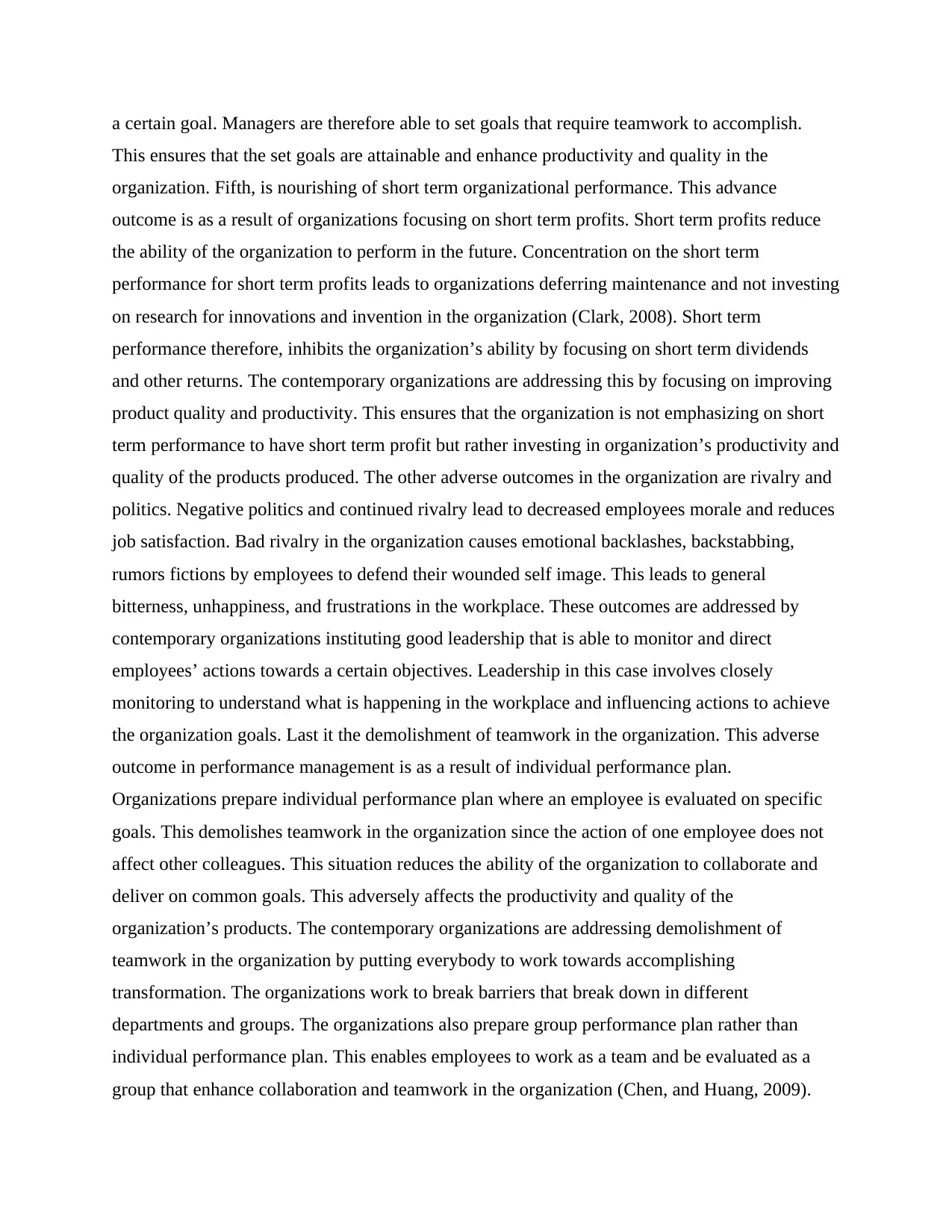
a certain goal. Managers are therefore able to set goals that require teamwork to accomplish.
This ensures that the set goals are attainable and enhance productivity and quality in the
organization. Fifth, is nourishing of short term organizational performance. This advance
outcome is as a result of organizations focusing on short term profits. Short term profits reduce
the ability of the organization to perform in the future. Concentration on the short term
performance for short term profits leads to organizations deferring maintenance and not investing
on research for innovations and invention in the organization (Clark, 2008). Short term
performance therefore, inhibits the organization’s ability by focusing on short term dividends
and other returns. The contemporary organizations are addressing this by focusing on improving
product quality and productivity. This ensures that the organization is not emphasizing on short
term performance to have short term profit but rather investing in organization’s productivity and
quality of the products produced. The other adverse outcomes in the organization are rivalry and
politics. Negative politics and continued rivalry lead to decreased employees morale and reduces
job satisfaction. Bad rivalry in the organization causes emotional backlashes, backstabbing,
rumors fictions by employees to defend their wounded self image. This leads to general
bitterness, unhappiness, and frustrations in the workplace. These outcomes are addressed by
contemporary organizations instituting good leadership that is able to monitor and direct
employees’ actions towards a certain objectives. Leadership in this case involves closely
monitoring to understand what is happening in the workplace and influencing actions to achieve
the organization goals. Last it the demolishment of teamwork in the organization. This adverse
outcome in performance management is as a result of individual performance plan.
Organizations prepare individual performance plan where an employee is evaluated on specific
goals. This demolishes teamwork in the organization since the action of one employee does not
affect other colleagues. This situation reduces the ability of the organization to collaborate and
deliver on common goals. This adversely affects the productivity and quality of the
organization’s products. The contemporary organizations are addressing demolishment of
teamwork in the organization by putting everybody to work towards accomplishing
transformation. The organizations work to break barriers that break down in different
departments and groups. The organizations also prepare group performance plan rather than
individual performance plan. This enables employees to work as a team and be evaluated as a
group that enhance collaboration and teamwork in the organization (Chen, and Huang, 2009).
This ensures that the set goals are attainable and enhance productivity and quality in the
organization. Fifth, is nourishing of short term organizational performance. This advance
outcome is as a result of organizations focusing on short term profits. Short term profits reduce
the ability of the organization to perform in the future. Concentration on the short term
performance for short term profits leads to organizations deferring maintenance and not investing
on research for innovations and invention in the organization (Clark, 2008). Short term
performance therefore, inhibits the organization’s ability by focusing on short term dividends
and other returns. The contemporary organizations are addressing this by focusing on improving
product quality and productivity. This ensures that the organization is not emphasizing on short
term performance to have short term profit but rather investing in organization’s productivity and
quality of the products produced. The other adverse outcomes in the organization are rivalry and
politics. Negative politics and continued rivalry lead to decreased employees morale and reduces
job satisfaction. Bad rivalry in the organization causes emotional backlashes, backstabbing,
rumors fictions by employees to defend their wounded self image. This leads to general
bitterness, unhappiness, and frustrations in the workplace. These outcomes are addressed by
contemporary organizations instituting good leadership that is able to monitor and direct
employees’ actions towards a certain objectives. Leadership in this case involves closely
monitoring to understand what is happening in the workplace and influencing actions to achieve
the organization goals. Last it the demolishment of teamwork in the organization. This adverse
outcome in performance management is as a result of individual performance plan.
Organizations prepare individual performance plan where an employee is evaluated on specific
goals. This demolishes teamwork in the organization since the action of one employee does not
affect other colleagues. This situation reduces the ability of the organization to collaborate and
deliver on common goals. This adversely affects the productivity and quality of the
organization’s products. The contemporary organizations are addressing demolishment of
teamwork in the organization by putting everybody to work towards accomplishing
transformation. The organizations work to break barriers that break down in different
departments and groups. The organizations also prepare group performance plan rather than
individual performance plan. This enables employees to work as a team and be evaluated as a
group that enhance collaboration and teamwork in the organization (Chen, and Huang, 2009).
⊘ This is a preview!⊘
Do you want full access?
Subscribe today to unlock all pages.

Trusted by 1+ million students worldwide
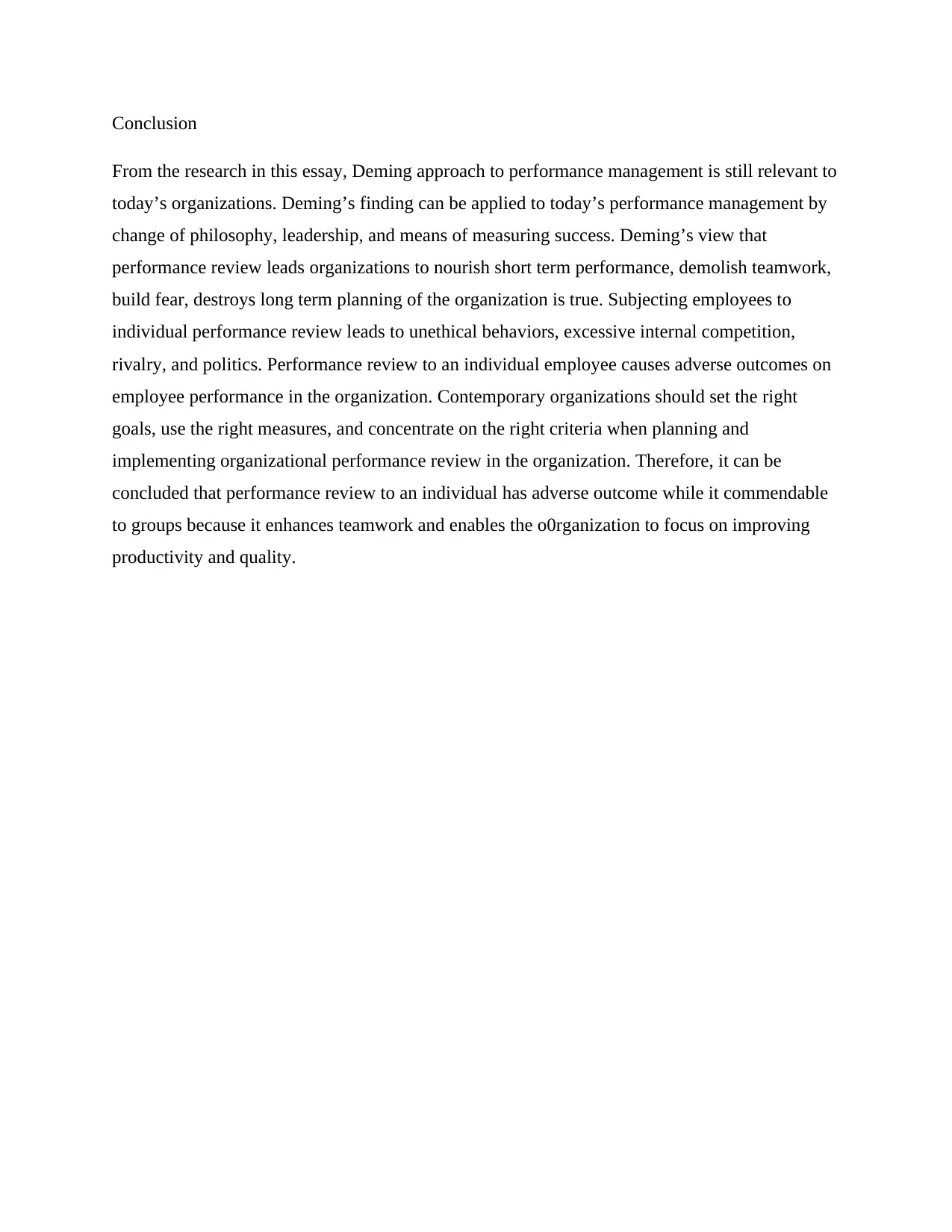
Conclusion
From the research in this essay, Deming approach to performance management is still relevant to
today’s organizations. Deming’s finding can be applied to today’s performance management by
change of philosophy, leadership, and means of measuring success. Deming’s view that
performance review leads organizations to nourish short term performance, demolish teamwork,
build fear, destroys long term planning of the organization is true. Subjecting employees to
individual performance review leads to unethical behaviors, excessive internal competition,
rivalry, and politics. Performance review to an individual employee causes adverse outcomes on
employee performance in the organization. Contemporary organizations should set the right
goals, use the right measures, and concentrate on the right criteria when planning and
implementing organizational performance review in the organization. Therefore, it can be
concluded that performance review to an individual has adverse outcome while it commendable
to groups because it enhances teamwork and enables the o0rganization to focus on improving
productivity and quality.
From the research in this essay, Deming approach to performance management is still relevant to
today’s organizations. Deming’s finding can be applied to today’s performance management by
change of philosophy, leadership, and means of measuring success. Deming’s view that
performance review leads organizations to nourish short term performance, demolish teamwork,
build fear, destroys long term planning of the organization is true. Subjecting employees to
individual performance review leads to unethical behaviors, excessive internal competition,
rivalry, and politics. Performance review to an individual employee causes adverse outcomes on
employee performance in the organization. Contemporary organizations should set the right
goals, use the right measures, and concentrate on the right criteria when planning and
implementing organizational performance review in the organization. Therefore, it can be
concluded that performance review to an individual has adverse outcome while it commendable
to groups because it enhances teamwork and enables the o0rganization to focus on improving
productivity and quality.
Paraphrase This Document
Need a fresh take? Get an instant paraphrase of this document with our AI Paraphraser
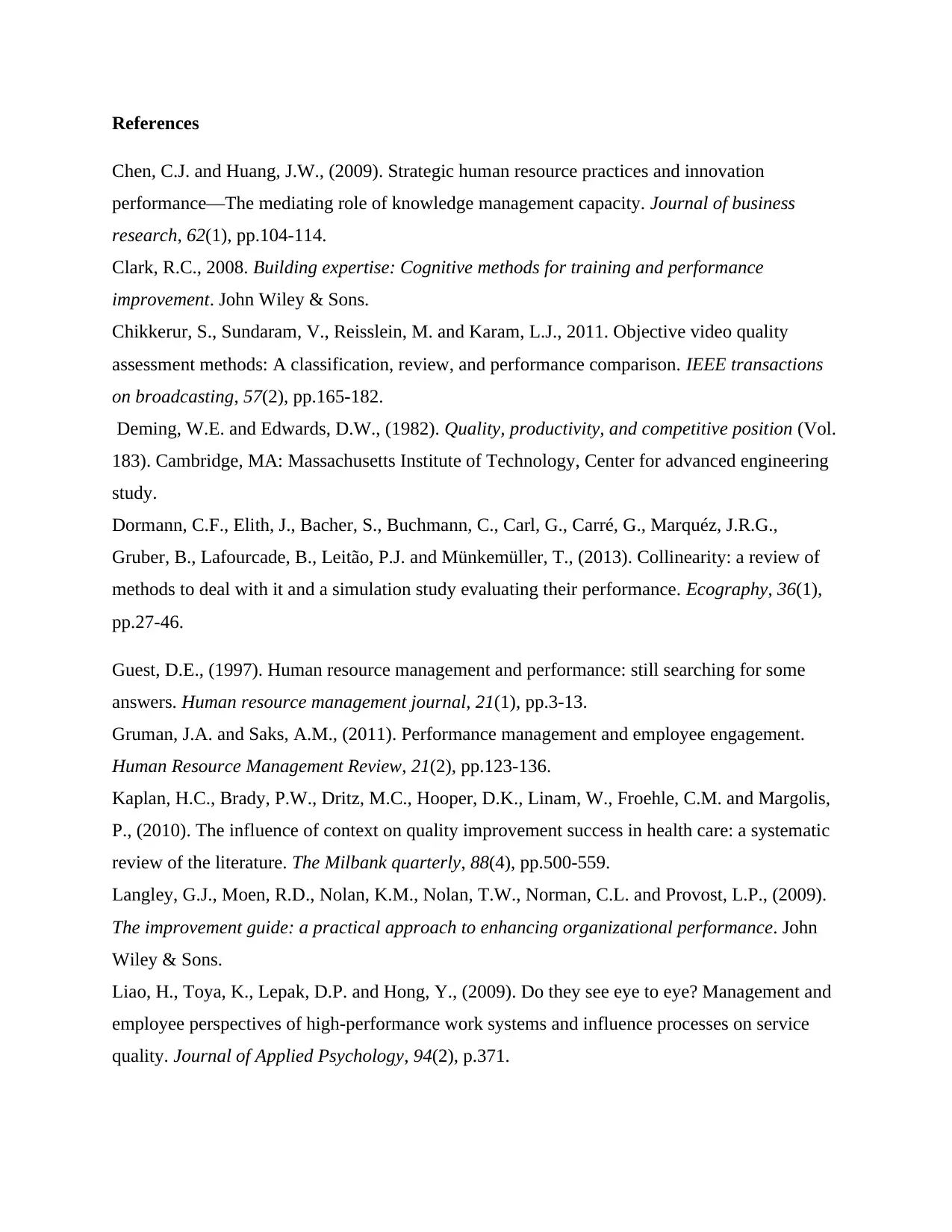
References
Chen, C.J. and Huang, J.W., (2009). Strategic human resource practices and innovation
performance—The mediating role of knowledge management capacity. Journal of business
research, 62(1), pp.104-114.
Clark, R.C., 2008. Building expertise: Cognitive methods for training and performance
improvement. John Wiley & Sons.
Chikkerur, S., Sundaram, V., Reisslein, M. and Karam, L.J., 2011. Objective video quality
assessment methods: A classification, review, and performance comparison. IEEE transactions
on broadcasting, 57(2), pp.165-182.
Deming, W.E. and Edwards, D.W., (1982). Quality, productivity, and competitive position (Vol.
183). Cambridge, MA: Massachusetts Institute of Technology, Center for advanced engineering
study.
Dormann, C.F., Elith, J., Bacher, S., Buchmann, C., Carl, G., Carré, G., Marquéz, J.R.G.,
Gruber, B., Lafourcade, B., Leitão, P.J. and Münkemüller, T., (2013). Collinearity: a review of
methods to deal with it and a simulation study evaluating their performance. Ecography, 36(1),
pp.27-46.
Guest, D.E., (1997). Human resource management and performance: still searching for some
answers. Human resource management journal, 21(1), pp.3-13.
Gruman, J.A. and Saks, A.M., (2011). Performance management and employee engagement.
Human Resource Management Review, 21(2), pp.123-136.
Kaplan, H.C., Brady, P.W., Dritz, M.C., Hooper, D.K., Linam, W., Froehle, C.M. and Margolis,
P., (2010). The influence of context on quality improvement success in health care: a systematic
review of the literature. The Milbank quarterly, 88(4), pp.500-559.
Langley, G.J., Moen, R.D., Nolan, K.M., Nolan, T.W., Norman, C.L. and Provost, L.P., (2009).
The improvement guide: a practical approach to enhancing organizational performance. John
Wiley & Sons.
Liao, H., Toya, K., Lepak, D.P. and Hong, Y., (2009). Do they see eye to eye? Management and
employee perspectives of high-performance work systems and influence processes on service
quality. Journal of Applied Psychology, 94(2), p.371.
Chen, C.J. and Huang, J.W., (2009). Strategic human resource practices and innovation
performance—The mediating role of knowledge management capacity. Journal of business
research, 62(1), pp.104-114.
Clark, R.C., 2008. Building expertise: Cognitive methods for training and performance
improvement. John Wiley & Sons.
Chikkerur, S., Sundaram, V., Reisslein, M. and Karam, L.J., 2011. Objective video quality
assessment methods: A classification, review, and performance comparison. IEEE transactions
on broadcasting, 57(2), pp.165-182.
Deming, W.E. and Edwards, D.W., (1982). Quality, productivity, and competitive position (Vol.
183). Cambridge, MA: Massachusetts Institute of Technology, Center for advanced engineering
study.
Dormann, C.F., Elith, J., Bacher, S., Buchmann, C., Carl, G., Carré, G., Marquéz, J.R.G.,
Gruber, B., Lafourcade, B., Leitão, P.J. and Münkemüller, T., (2013). Collinearity: a review of
methods to deal with it and a simulation study evaluating their performance. Ecography, 36(1),
pp.27-46.
Guest, D.E., (1997). Human resource management and performance: still searching for some
answers. Human resource management journal, 21(1), pp.3-13.
Gruman, J.A. and Saks, A.M., (2011). Performance management and employee engagement.
Human Resource Management Review, 21(2), pp.123-136.
Kaplan, H.C., Brady, P.W., Dritz, M.C., Hooper, D.K., Linam, W., Froehle, C.M. and Margolis,
P., (2010). The influence of context on quality improvement success in health care: a systematic
review of the literature. The Milbank quarterly, 88(4), pp.500-559.
Langley, G.J., Moen, R.D., Nolan, K.M., Nolan, T.W., Norman, C.L. and Provost, L.P., (2009).
The improvement guide: a practical approach to enhancing organizational performance. John
Wiley & Sons.
Liao, H., Toya, K., Lepak, D.P. and Hong, Y., (2009). Do they see eye to eye? Management and
employee perspectives of high-performance work systems and influence processes on service
quality. Journal of Applied Psychology, 94(2), p.371.
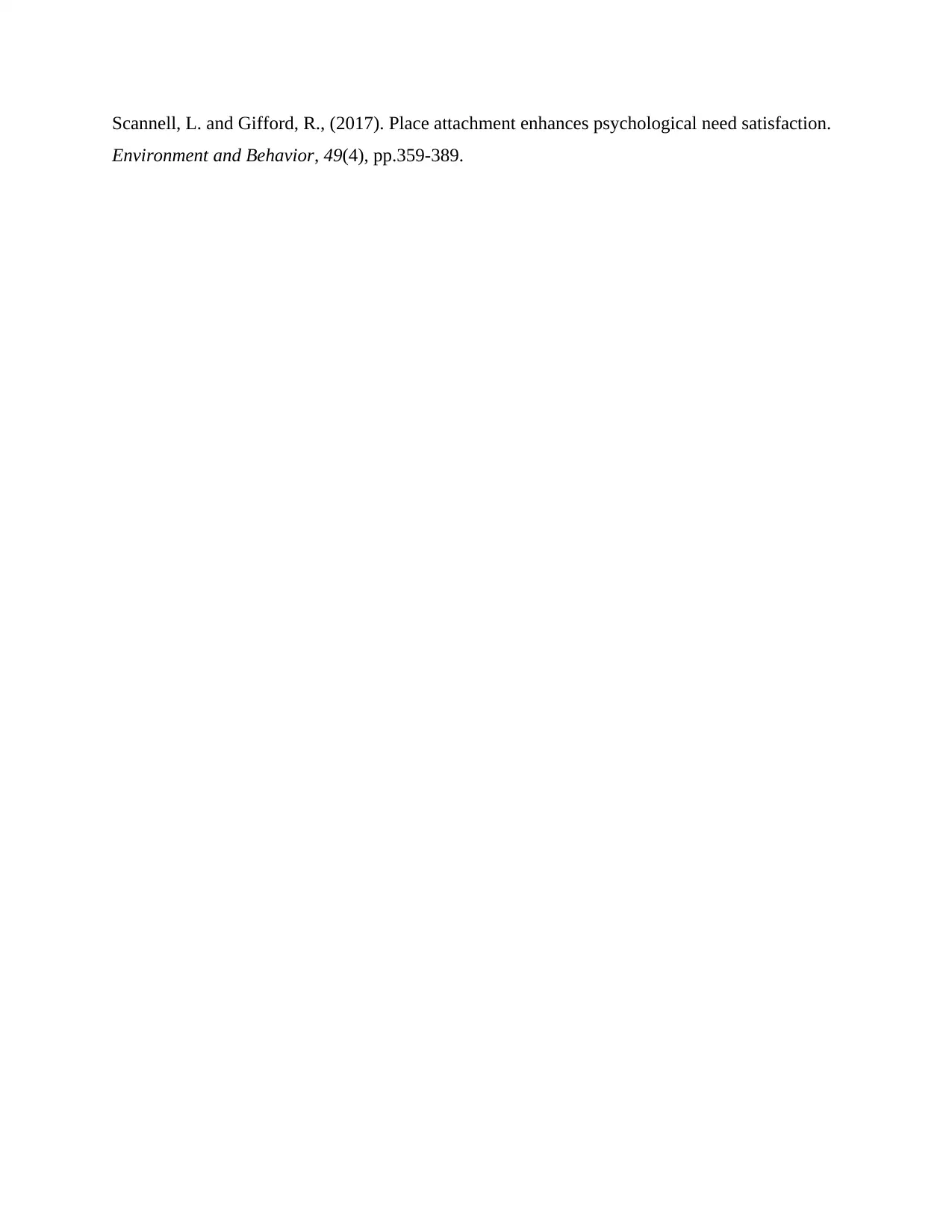
Scannell, L. and Gifford, R., (2017). Place attachment enhances psychological need satisfaction.
Environment and Behavior, 49(4), pp.359-389.
Environment and Behavior, 49(4), pp.359-389.
⊘ This is a preview!⊘
Do you want full access?
Subscribe today to unlock all pages.

Trusted by 1+ million students worldwide
1 out of 9
Related Documents
Your All-in-One AI-Powered Toolkit for Academic Success.
+13062052269
info@desklib.com
Available 24*7 on WhatsApp / Email
![[object Object]](/_next/static/media/star-bottom.7253800d.svg)
Unlock your academic potential
Copyright © 2020–2026 A2Z Services. All Rights Reserved. Developed and managed by ZUCOL.





